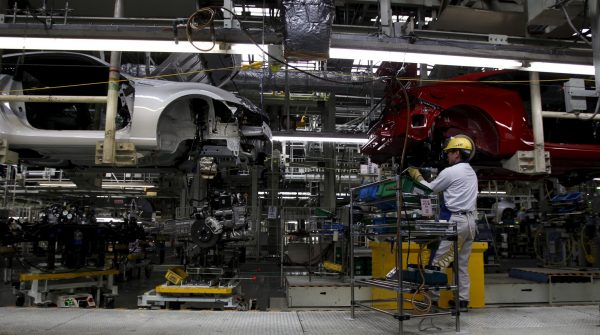For a country with no hinterland and limited resource endowments, there is no comfortable retreat to less dependence on global trade. The economic costs of anything remotely like self-sufficiency would be very high — estimated to reduce living standards in Japan to roughly what they were immediately after the war when people were starving and begging in the streets. The costs of managing political relations to procure supplies and access markets in such a world would be even more burdensome, in terms of political dependency on powers big and strategically placed to press for economic favours.
More than other defeated powers (Germany and Italy, nested as they are in continental Europe) understanding and appreciation of the post-war Bretton Woods-inspired global order is lodged deeply in Japan’s national DNA.
US President Donald Trump seems set on tearing that order apart. He’s embarked on an escalating trade war with China, Japan’s major trading partner, significantly a consequence of its having joined the rules-based global trading order. He’s imposed tariffs, illegally under international trade law, against Japan and other countries and threatened tariffs on Japan’s core export industry, automobile manufacture.
Japan’s strategic choices in the post-Trump world have narrowed sharply.
At the IMF–World Bank meetings in Indonesia this week, Director General of the WTO, Roberto Azevedo, was reluctant to be drawn on whether the world already had a trade war on its hands but willingly conceded that: ‘Many shots have already been fired’. Japan has made clear where it stands on global trade policy through its energetic pursuit of TPP-11 (when Trump dropped out of TPP), its call for multilateralism in the G20 and G7, and its acceleration of the negotiation of the Regional Comprehensive Economic Partnership (RCEP) in East Asia. To save the system will require much more than that.
That is one tough spot that Japan is in as it confronts hard choices about its national strategic interests amid these new global economic uncertainties.
The other tough spot is that, under the US–Japan Security Treaty, the United States remains, for now at least, Japan’s principal military security guarantor in Asia and the Pacific. Japan is at the frontline of the big security risks in Northeast Asia — on the Korean peninsula, over Taiwan and in the East and South China Seas. Yet Mr Trump has talked Japan’s part in these arrangements down. He’s dabbled in public with throwing these security issues into the mix in negotiating relatively trivial trade concessions out of Japan. And on top of all of this his Vice President, Mike Pence, aggravated relations with China last week, by casting it as an active aggressor against a whole range of American interests.
In our lead essay this week, Shiro Armstrong explains that Japan is now ‘fully embarked on navigating a course through the economic and national security minefield that lies between the United States and China’.
Japan perhaps is not noted for hard-nosed, forward-looking strategic diplomatic action. It’s far more comfortable in normal circumstances, by cultural and institutional composition, to ‘leading from behind’. These are no normal circumstances. Whatever Prime Minister Abe’s personal instincts in dealing with Mr Trump, the threat to Japanese economic and political security from the trade war, the management of the Korean peninsula problem and relations with China, he and his advisors have put Japan on the front foot diplomatically.
In a game of high stakes diplomacy, Japan has entered negotiations on trade with the Trump administration looking to hopefully reach a settlement that does not undermine the multilateral system. This is ‘a defensive move aimed to stave off US Section 232 tariffs on Japanese automobiles — under the guise of US national security concerns — that would hit Japan’s most important and internationally competitive industry hard’, Armstrong says.
Next week Mr Abe is off to Beijing, in the next high-profile phase of warming relations with China.
‘Mr Abe will arrive in Beijing with a large business delegation on his mission to restore normalcy in Japan’s relationship with China’, says Armstrong. ‘All eyes will be on what the immediate payoff from the improving relationship between the two Asian giants might be’.
If the visit succeeds, it could be a significant game-changer. Not only could we could see joint Chinese–Japanese infrastructure investment projects in Southeast Asia and beyond. Giving some the projects the go-ahead would bring considerable benefits to Japanese business. But much more important is what it would signal about Chinese intentions to play the multilateral economic game.
Agreement on infrastructure cooperation, Armstrong argues, would be a big step forward in diversifying regional economic and political risk. Japan and China are the two key players in regional economic cooperation, for example in bringing a credible trade and economic cooperation agreement through RCEP. Commitment to conclude the agreement and establish a continuing economic cooperation arrangement would be an important political stabilising influence in the region as well as globally.
Much hangs on the Abe–Xi meeting next week and Xi’s visit to Japan early next year that is likely to follow. Entente between these two unlikely partners in Asia could indeed help to walk the world back from the tough spots that confront Japan and our region today.
The EAF Editorial Board is located in the Crawford School of Public Policy, College of Asia and the Pacific, The Australian National University.

